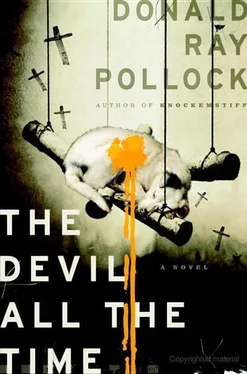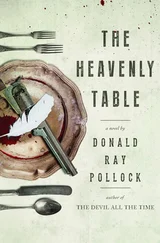Three hours later, Theodore said, “It ain’t gonna happen, Roy.” He sat in his wheelchair a few feet from Helen’s body holding the screwdriver. Roy was down on his knees beside his wife, holding her hand, still trying to coax her back to life. At first his supplications had rung through the woods with faith and fervor, but the longer he went without even a twitch from her cold body, the more garbled and deranged they had become. Theodore could feel the onslaught of a headache. He wished he had brought something to drink.
Roy looked up at his crippled cousin with tears running down his face. “Jesus, I think I killed her.”
Theodore pushed himself closer and pressed the back of his dirty hand against her face. “She’s dead, all right.”
“Don’t you touch her,” Roy yelled.
“I’m just trying to help.”
Roy struck the ground with his fist. “It wasn’t supposed to be this way.”
“I hate to say it, but if they catch you for this, them ol’ boys in Moundsville will fry you like bacon.”
Roy shook his head, wiped the snot from his face with his shirtsleeve. “I don’t know what went wrong. I thought for sure …” His voice dwindled away, and he let go of her hand.
“Shit, you just miscalculated, that’s all,” Theodore said. “Anybody could have done that.”
“What the hell am I gonna do now?” Roy said.
“You could always run,” Theodore said. “That’s the only smart thing to do in a situation like this. I mean, fuck, what you got to lose?”
“Run where?”
“I been sitting here thinking on it, and I figure that old car would probably make it to Florida if you babied it.”
“I don’t know,” Roy said.
“Sure you do,” Theodore said. “Look, once we get there, we sell the car and start preaching again. That’s what we should have been doing all along.” He looked down at pale, bloody Helen. Her whining days were over with. He almost wished he had killed her himself. She had ruined everything. By now, they might have had their own church, maybe even been on the radio.
“We?”
“Well, yeah,” Theodore said, “you gonna need a guitar player, ain’t you?” For a long time he had dreamed of going to Florida, living by the ocean. It was hard to live the crippled life surrounded by all these lousy hills and trees.
“But what about her?” Roy said, pointing at Helen’s body.
“You gonna have to bury her deep, brother,” Theodore said. “I put a shovel in the boot just in case things didn’t turn out like you expected.”
“And Lenora?”
“Believe me, that baby will be better off with the old lady,” Theodore said. “You don’t want your kid growing up running from the law, do you?” He looked up through the trees. The sun had disappeared behind a wall of dark clouds, and the sky had turned the color of ash. The damp smell of rain was in the air. From over around Rocky Gap came a slow, faint rumble of thunder. “Now you better start digging before we get soaked.”
WHEN EARSKELL CAME IN THAT NIGHT, Emma was sitting in a chair by the window rocking Lenora. It was nearly eleven o’clock, and the storm was just starting to ease off. “Helen told me they wouldn’t be gone but a couple hours,” the old woman said. “She only left one bottle of milk.”
“Aw, you know them preachers,” Earskell said. “They probably went out and got on a good one. Hell, from what I hear, that crippled boy could drink me under the table.”
Emma shook her head. “I wish we had a phone. There’s something about this just don’t feel right to me.”
The old man peered down at the sleeping infant. “Poor little thing,” he said. “She looks just like her mother, don’t she?”
WHEN ARVIN WAS FOUR YEARS OLD, Willard decided that he didn’t want his son growing up in Meade around all the degenerates. They had been living in Charlotte’s old apartment above the dry cleaners ever since they had gotten married. It seemed to him as if every pervert in southern Ohio was located in Meade. Lately, the newspaper was filled with their sick shenanigans. Just two days ago a man named Calvin Claytor had been arrested in the Sears and Roebuck with a foot of Polish sausage tied to his thigh. According to the Meade Gazette , the suspect, dressed only in ripped coveralls, was caught brushing up against elderly women in what the reporter described as a “lewd and aggressive manner.” As far as Willard was concerned, that Claytor sonofabitch was even worse than the retired state representative the sheriff caught parked along the highway on the outskirts of town with a chicken stuck to his privates, a Rhode Island Red that he’d purchased for fifty cents from a nearby farm. They’d had to take him to the hospital to cut it off. People said that the deputy, out of respect for the other patients or maybe the victim, had covered the hen with his uniform jacket when they marched the man into the ER. “That’s somebody’s mother the bastard was doing that to,” Willard told Charlotte.
“Which one?” she asked. She was standing at the stove stirring a pot of spaghetti.
“Jesus, Charlotte, the sausage man,” he said. “They oughta cram that thing down his throat.”
“I don’t know,” his wife said. “I don’t see that being as bad as someone messing with animals.”
He looked over at Arvin, sitting on the floor rolling a toy truck back and forth. From all indications, the country was going to hell in a hurry. Two months ago, his mother had written him that they had finally found Helen Laferty’s body, what little was left of it anyway, buried in the woods a few miles from Coal Creek. He had read the letter every night for a week. Charlotte had noticed that Willard started becoming increasingly upset about the news in the paper right after that. Though Roy and Theodore were the prime suspects, there hadn’t been a sign of them anywhere for almost three years, so the sheriff still couldn’t rule out that they might have also been murdered and dumped elsewhere. “We don’t know, could have been the same one butchered them people in Millersburg that time,” the sheriff told Emma when he came with the news that Helen’s grave had been found by a couple of ginseng hunters. “He might have killed the girl, then cut them boys up and scattered them. The one in the wheelchair would have been easy pickings, and everybody knows that other one didn’t have sense enough to pour piss out of a boot.”
Regardless of what the law said, Emma was convinced that the two were alive and guilty, and she wouldn’t rest easy until they were locked up or dead. She told Willard she was raising the little girl as best she could. He had sent her a hundred dollars to help pay for a proper burial. Sitting there watching his son, Willard suddenly had an intense desire to pray. Though he hadn’t talked to God in years, not a single petition or word of praise since he’d come across the crucified marine during the war, he could feel it welling up inside him now, the urge to get right with his Maker before something bad happened to his family. But looking around the cramped apartment, he knew he couldn’t get in touch with God here, no more than he’d ever been able to in a church. He was going to need some woods to worship his way. “We got to get out of this place,” he told Charlotte, laying the newspaper down on the coffee table.
THEY RENTED THE FARMHOUSE on top of the Mitchell Flats for thirty dollars a month from Henry Delano Dunlap, a plump, girlish lawyer with shiny, immaculate fingernails who lived over by the Meade Country Club and dabbled in real estate as a hobby. Though at first Charlotte had been against it, she soon fell in love with the leaky, run-down house. She didn’t even mind pumping her water from the well. Within a few weeks after they moved in, she was talking about someday buying it. Her father had died of tuberculosis when she was just five years old, and her mother had succumbed to a blood infection just after Charlotte entered the ninth grade. All her life, she’d lived in gloomy, roach-infested apartments rented by the week or month. The only family member she still had living was her sister, Phyllis, but Charlotte didn’t even know where she was anymore. One day six years ago, Phyllis had walked into the Wooden Spoon wearing a new hat and handed Charlotte her key to the three rooms they shared above the dry cleaners on Walnut Street. “Well, Sis,” she said, “I got you raised and now it’s my turn,” and out the door she went. Owning the farmhouse would finally mean some stability in her life, something she craved more than anything, especially now that she was a mother. “Arvin needs to have somewhere he can always call home,” she told Willard. “I never did have that.” Every month they struggled to put another thirty dollars away for a down payment. “You just wait and see,” she said. “This place will be ours someday.”
Читать дальше












